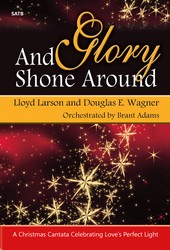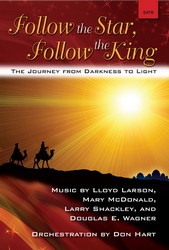Scripture References:
st. 1-3 = Matt. 1:1-12 [sic Matt. 2:11-12]
st. 4-5 = Rev. 21:23, Rev. 22:5
Inspired by the Epiphany gospel, Matthew 1:1-11 [sic Matthew 2:1-11], William C. Dix (b. Bristol, England, 1837; d. Cheddar, Somerset, England, 1898) wrote this text in 1858 while recuperating from illness. The text was first published in A. H. Ward's Hymns for Public Worship and Private Devotion (1860). The following year it was published in both Dix's Hymns of Love and Joy and Hymns Ancient and Modern.
Taking Matthew 1: 1-11 as his theme for stanzas 1-3, Dix likens the journey of the wise men who came to worship the Christ to our own Christian pilgrimage. The pattern of these stanzas is "as they … so may we." Stanzas 4 and 5 are a prayer that our journey on the "narrow way" may bring us finally to glory where Christ is the light (Rev. 21:23) and where we may perfectly sing his praise.
Most British hymn writers in the nineteenth century were clergymen, but Dix was a notable exception. Trained in the business world, he became the manager of a marine insurance company in Glasgow, Scotland. Dix published various volumes of his hymns, such as Hymns of Love and Joy (1861) and Altar Songs: Verses on the Holy Eucharist (1867). A number of his texts were first published in Hymns Ancient and Modern (1861). In addition to the two printed in the Psalter Hymnal (also 406), another popular hymn by Dix is "What Child Is This."
Liturgical Use:
Epiphany; Christmas season.
--Psalter Hymnal Handbook
==============
As with gladness men of old. W. C. Dix. [Epiphany.] "Written about 1860 during an illness" (E. MSS.) and first printed in a small collection of hymns for private circulation, entitled Hymns of Love and Joy, and then in the trial copy of Hymns Ancient & Modern. In 1861 it was published in 5 stanzas of 6 lines almost simultaneously in the St. Raphael’s Hymnal, Bristol, and in Hymns Ancient & Modern. From that date it has been incorporated in nearly every new hymnal and in new editions of the older collections in all English-speaking countries. Very slight variations in the text are sometimes found, as in the revised edition of Hymns Ancient &. Modern, 1875. The author's authorized text is in Church Hymns, 1871, and Thring's Collection, 1882. This hymn was brought into great prominence by Sir Roundell Palmer (Lord Selborne) in his paper on English Church Hymnody, at the Church Congress at York in 1866:—
"Of writers still living (the names of many, and of some very eminent, will at once occur to my hearers), I do not feel called upon to make myself, in this place, either the critic or the eulogist. But I may be permitted to say, that the most favourable hopes may be entertained of the future prospects of British Hymnody, when among its most recent fruits is a work so admirable in every respect as the Epiphany Hymn of Mr. Chatterton Dix; than which there can be no more appropriate conclusion to this lecture, 'As with gladness men of old.'"
An anonymous hymn—"As in Eastern lands afar"—given in Holy Song for all Seasons, London, Bell and Daldy, 1869, in 4 stanzas of 8 lines, is based upon, and is an imitation of "As with gladness men of old." We have not met with it elsewhere.
-- John Julian, Dictionary of Hymnology (1907)
Notes
Scripture References:
st. 1-3 = Matt. 1:1-12 [sic Matt. 2:11-12]
st. 4-5 = Rev. 21:23, Rev. 22:5
Inspired by the Epiphany gospel, Matthew 1:1-11 [sic Matthew 2:1-11], William C. Dix (b. Bristol, England, 1837; d. Cheddar, Somerset, England, 1898) wrote this text in 1858 while recuperating from illness. The text was first published in A. H. Ward's Hymns for Public Worship and Private Devotion (1860). The following year it was published in both Dix's Hymns of Love and Joy and Hymns Ancient and Modern.
Taking Matthew 1: 1-11 as his theme for stanzas 1-3, Dix likens the journey of the wise men who came to worship the Christ to our own Christian pilgrimage. The pattern of these stanzas is "as they … so may we." Stanzas 4 and 5 are a prayer that our journey on the "narrow way" may bring us finally to glory where Christ is the light (Rev. 21:23) and where we may perfectly sing his praise.
Most British hymn writers in the nineteenth century were clergymen, but Dix was a notable exception. Trained in the business world, he became the manager of a marine insurance company in Glasgow, Scotland. Dix published various volumes of his hymns, such as Hymns of Love and Joy (1861) and Altar Songs: Verses on the Holy Eucharist (1867). A number of his texts were first published in Hymns Ancient and Modern (1861). In addition to the two printed in the Psalter Hymnal (also 406), another popular hymn by Dix is "What Child Is This."
Liturgical Use:
Epiphany; Christmas season.
--Psalter Hymnal Handbook
==============
As with gladness men of old. W. C. Dix. [Epiphany.] "Written about 1860 during an illness" (E. MSS.) and first printed in a small collection of hymns for private circulation, entitled Hymns of Love and Joy, and then in the trial copy of Hymns Ancient & Modern. In 1861 it was published in 5 stanzas of 6 lines almost simultaneously in the St. Raphael’s Hymnal, Bristol, and in Hymns Ancient & Modern. From that date it has been incorporated in nearly every new hymnal and in new editions of the older collections in all English-speaking countries. Very slight variations in the text are sometimes found, as in the revised edition of Hymns Ancient &. Modern, 1875. The author's authorized text is in Church Hymns, 1871, and Thring's Collection, 1882. This hymn was brought into great prominence by Sir Roundell Palmer (Lord Selborne) in his paper on English Church Hymnody, at the Church Congress at York in 1866:—
"Of writers still living (the names of many, and of some very eminent, will at once occur to my hearers), I do not feel called upon to make myself, in this place, either the critic or the eulogist. But I may be permitted to say, that the most favourable hopes may be entertained of the future prospects of British Hymnody, when among its most recent fruits is a work so admirable in every respect as the Epiphany Hymn of Mr. Chatterton Dix; than which there can be no more appropriate conclusion to this lecture, 'As with gladness men of old.'"
An anonymous hymn—"As in Eastern lands afar"—given in Holy Song for all Seasons, London, Bell and Daldy, 1869, in 4 stanzas of 8 lines, is based upon, and is an imitation of "As with gladness men of old." We have not met with it elsewhere.
-- John Julian, Dictionary of Hymnology (1907)
Hymnary Pro Subscribers
Access
an additional article
on the Canterbury Dictionary of Hymnology:
Hymnary Pro subscribers have full access to the Canterbury Dictionary of Hymnology.
Subscribe now


 My Starred Hymns
My Starred Hymns








